1
The Lord commands us to do good unto all men without exception, though the majority are very undeserving when judged according to their own merits... [The Scripture] teaches us that we must not think of man's real value, but only of his creation in the image of God to which we owe all possible honor and love.John Calvin
2
Those who set up a fictitious worship, merely worship and adore their own delirious fancies; indeed, they would never dare so to trifle with God, had they not previously fashioned him after their own childish conceits.John Calvin
3
The whole world is a theatre for the display of the divine goodness, wisdom, justice, and power, but the Church is the orchestra, as it were–the most conspicuous part of it; and the nearer the approaches are that God makes to us, the more intimate and condescending the communication of his benefits, the more attentively are we called to consider them.John Calvin
4
In a way, the futile excuses many people use to cover their superstitions are demolished. They think it is enough to have some sort of religious fervor, however ridiculous, not realizing that true religion must be according to God's will as the perfect measure; that He can never deny Himself and is no mere spirit form to be changed around according to individual preference.John Calvin
5
Were the judgments of mankind correct, custom would be regulated by the good. But it is often far otherwise in point of fact; for, whatever the many are seen to do, forthwith obtains the force of custom. But human affairs have scarcely ever been so happily constituted as that the better course pleased the greater number. Hence the private vices of the multitude have generally resulted in public error, or rather that common consent in vice which these worthy men would have to be law. .John Calvin
6
For though God has promised to do whatsoever his people may ask, yet he does not allow them an unbridled liberty to ask whatever may come to their minds; but he has at the same time prescribed to them a law according to which they are to pray. And doubtless nothing is better for us than this restriction; for if it was allowed to every one of us to ask what he pleased, and if God were to indulge us in our wishes, it would be to provide very badly for us. For what may be expedient we know not; nay, we boil over with corrupt and hurtful desires. But God supplies a twofold remedy, lest we should pray otherwise than according to what his own will has prescribed; for he teaches us by his word what he would have us to ask, and he has also set over us his Spirit as our guide and ruler, to restrain our feelings, so as not to suffer them to wander beyond due bounds. For what or how to pray, we know not, says Paul, but the Spirit helpeth our infirmity, and excites in us unutterable groans. (Romans 8:26.) We ought also to ask the mouth of the Lord to direct and guide our prayers; for God in his promises has fixed for us, as it has been said, the right way of praying.John Calvin

7
Men are undoubtedly more in danger from prosperity than from adversity. for when matters go smoothly, they flatter themselves, and are intoxicated by their successJohn Calvin
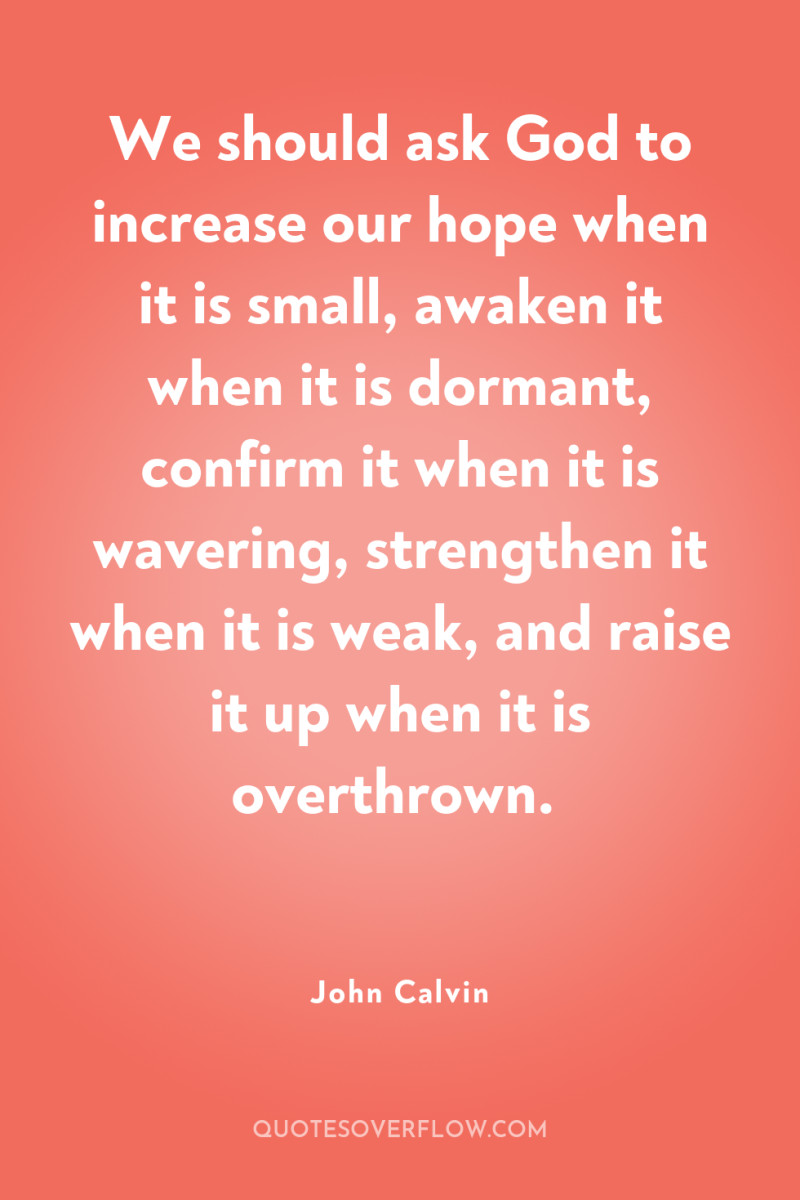
8
We should ask God to increase our hope when it is small, awaken it when it is dormant, confirm it when it is wavering, strengthen it when it is weak, and raise it up when it is overthrown.John Calvin
9
I was always exceedingly delighted with that saying of Chrysostom, "The foundation of our philosophy is humility"; and yet more pleased with that of Augustine: "As the orator, when asked, What is the first precept in eloquence? answered, Delivery: What is the second? Delivery: What is the third? Delivery: so if you ask me concerning the precepts of the Christian religion, I will answer, first, second, and third, Humility.John Calvin
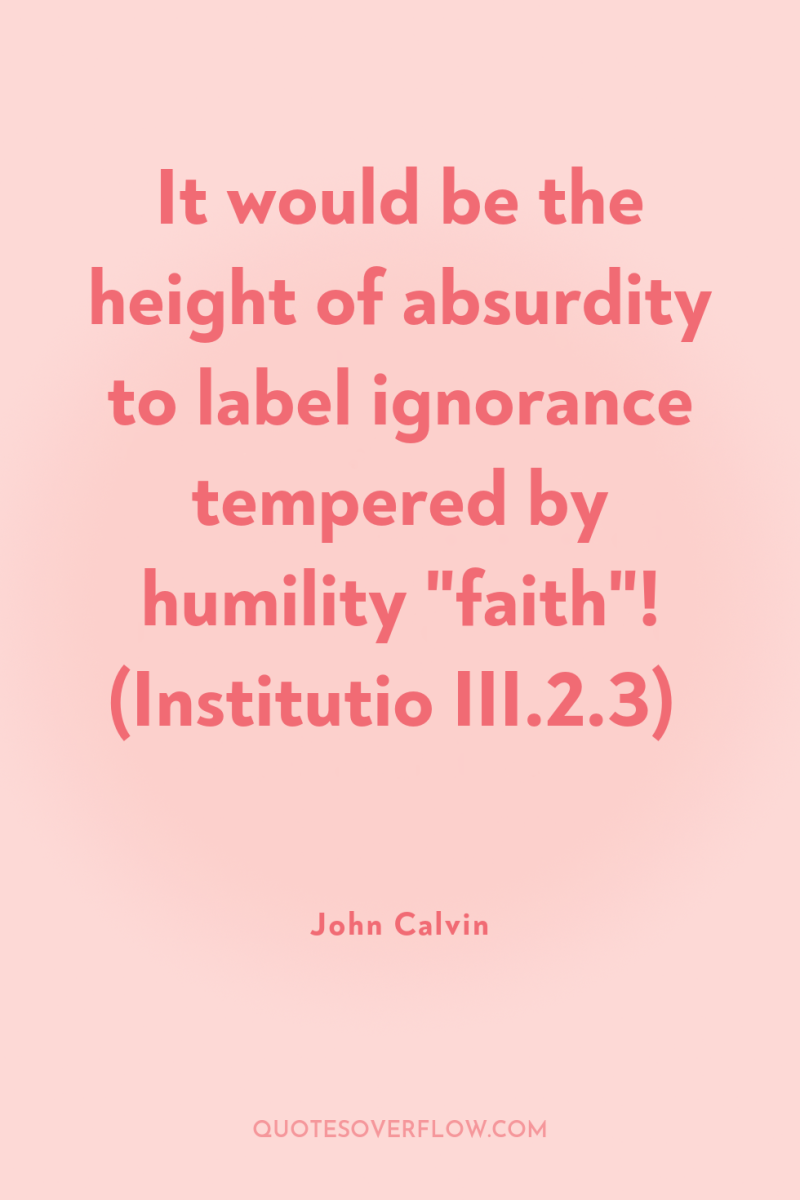
10
It would be the height of absurdity to label ignorance tempered by humility "faith"! (Institutio III.2.3)John Calvin

11
True wisdom consists in two things: Knowledge of God and Knowledge of Self.John Calvin
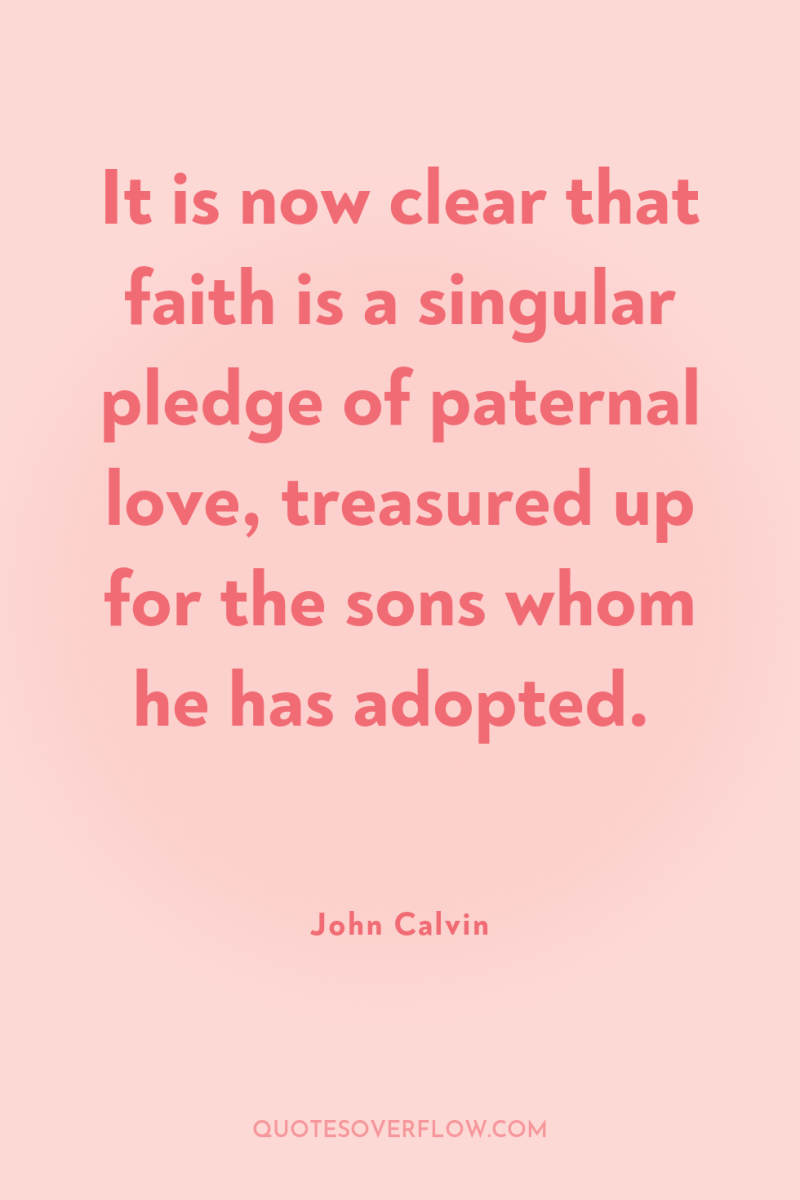
12
It is now clear that faith is a singular pledge of paternal love, treasured up for the sons whom he has adopted.John Calvin

13
There is no knowing that does not begin with knowing God.John Calvin
14
No one can travel so far that he does not make some progess each day. So let us never give up. Then we shall move forward daily in the Lord's way. And let us never despair because of our limited success. Even though it is so much less than we would like, our labour is not wasted when today is better than yesterday!John Calvin
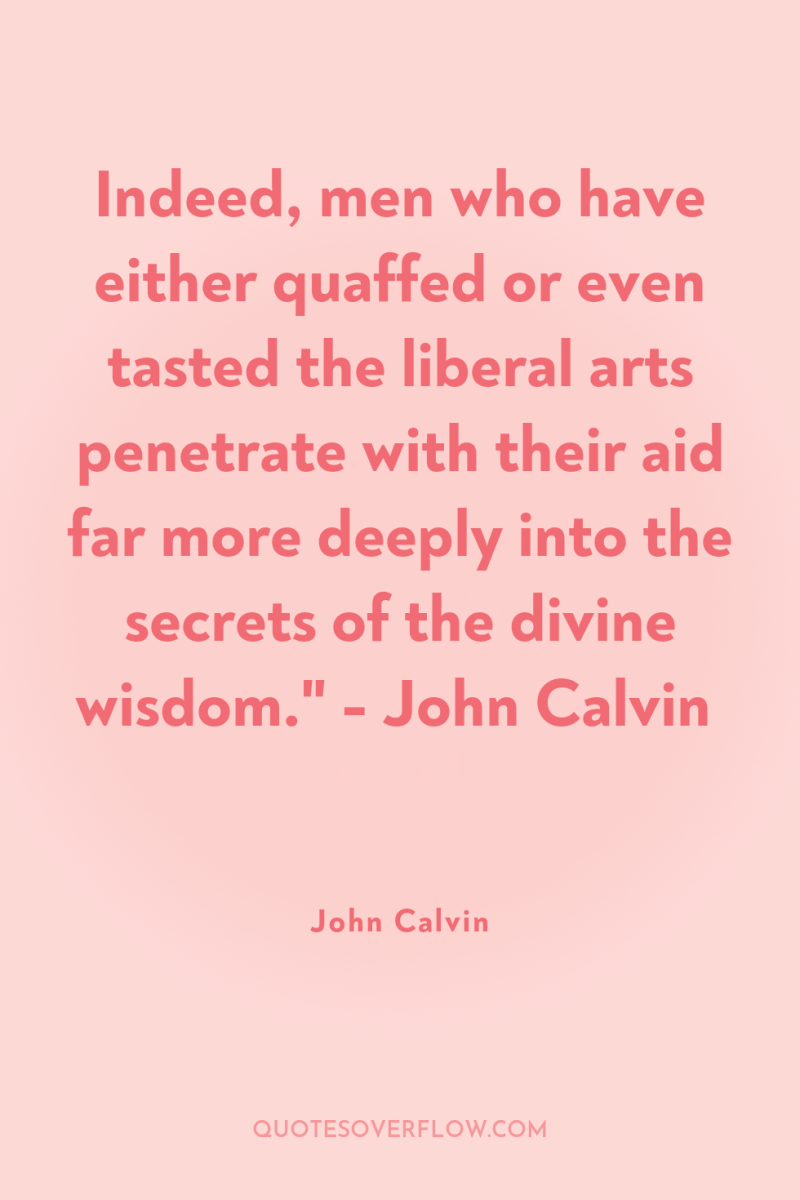
15
Indeed, men who have either quaffed or even tasted the liberal arts penetrate with their aid far more deeply into the secrets of the divine wisdom." - John CalvinJohn Calvin
16
It is not the mere fear of punishment that restrains [man] from sin. Loving and revering God as his father, honouring and obeying Him as his master, although there were no hell, he would revolt at the very idea of offending Him.John Calvin
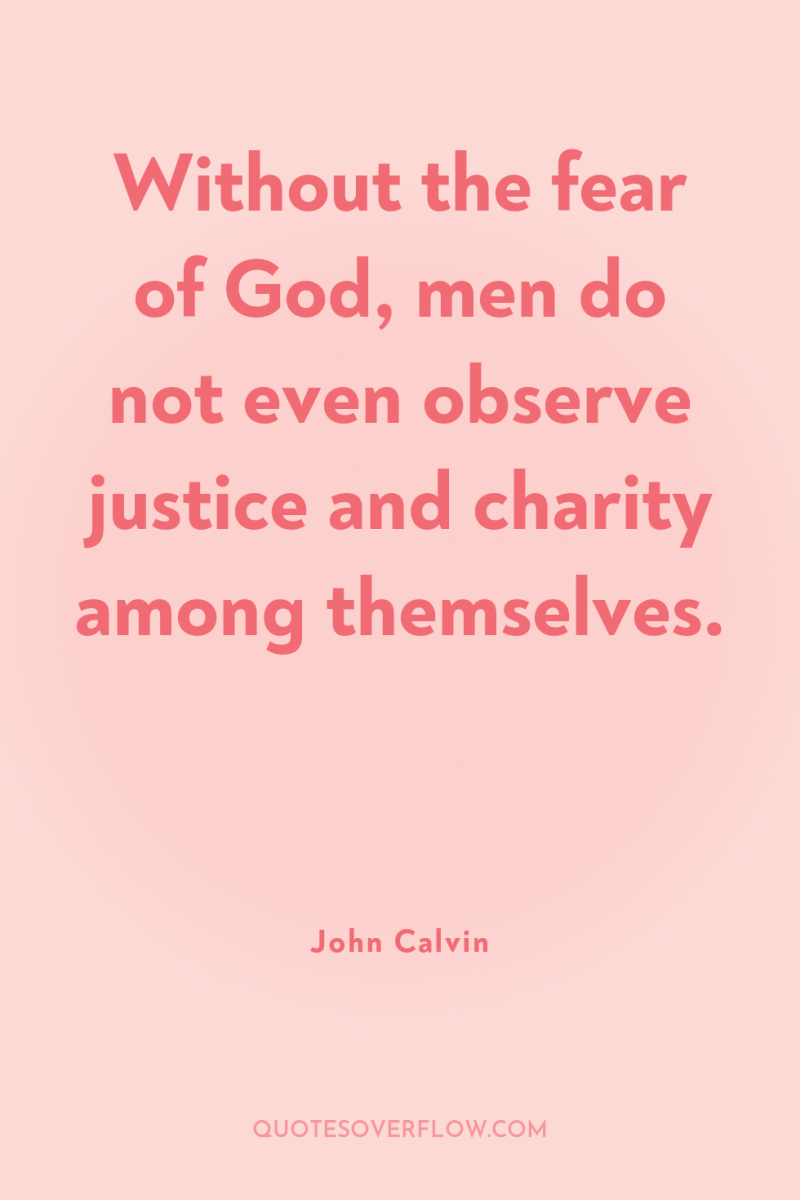
17
Without the fear of God, men do not even observe justice and charity among themselves.John Calvin
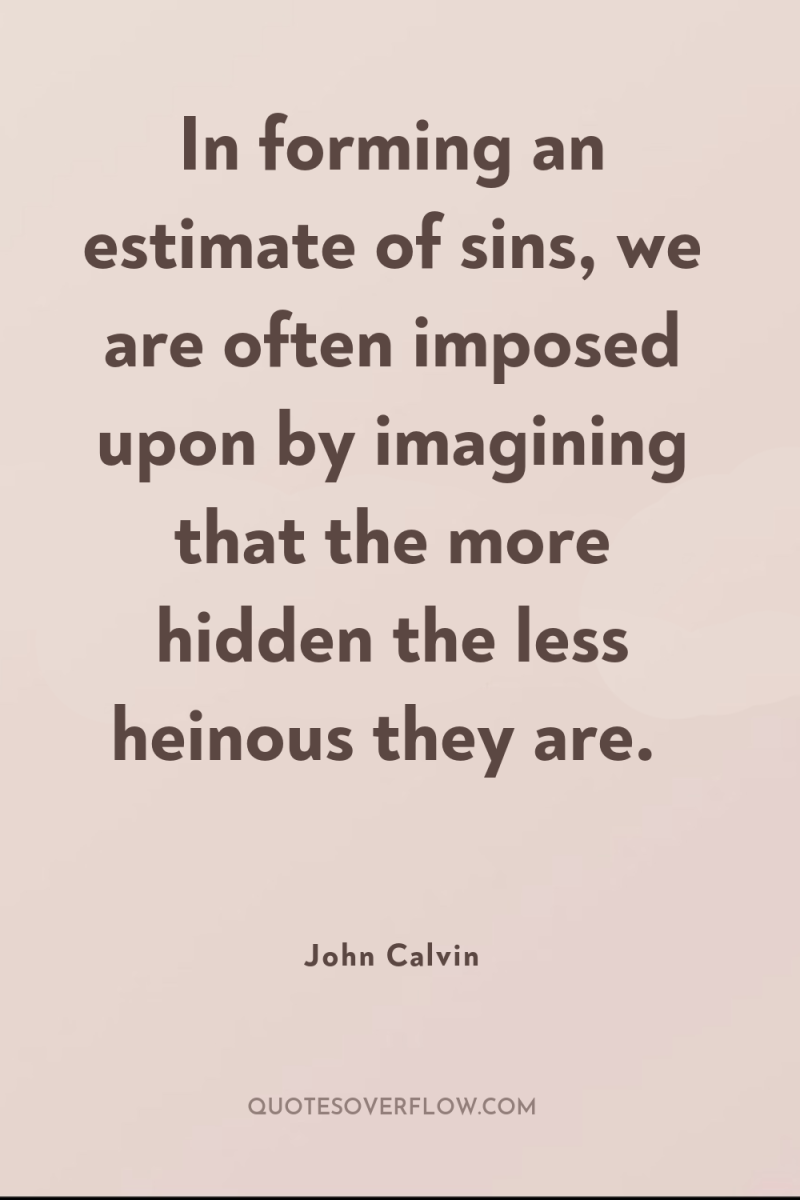
18
In forming an estimate of sins, we are often imposed upon by imagining that the more hidden the less heinous they are.John Calvin
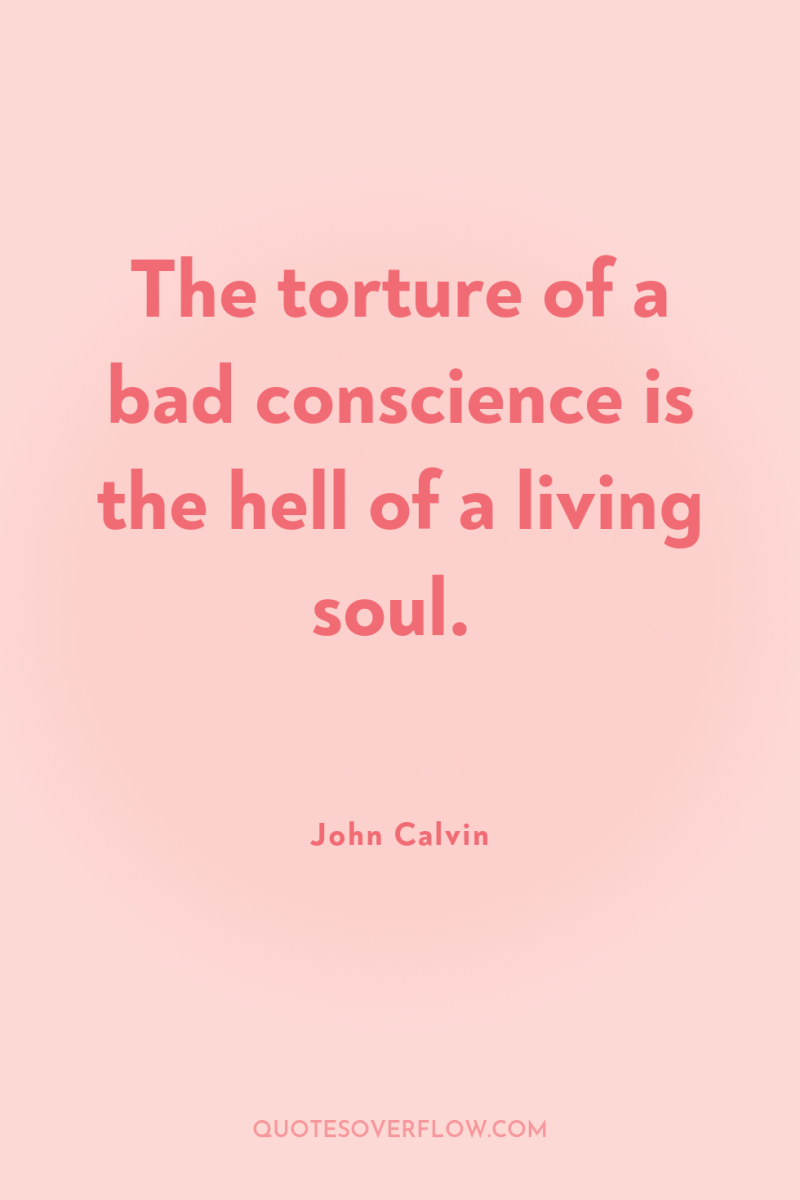
19
The torture of a bad conscience is the hell of a living soul.John Calvin
20
The gospel is not a doctrine of the tongue, but of life. It cannot be grasped by reason and memory only, but it is fully understood when it possesses the whole soul and penetrates to the inner recesses of the heart.John Calvin
21
All the blessings we enjoy are Divine deposits, committed to our trust on this condition, that they should be dispensed for the benefit of our neighbors.John Calvin
22
The salvation of all the elect is not less certain than the power of God is invincible.John Calvin
23
When God descends to us he, in a certain sense, abases himself and stammers with us, so He allows us to stammer with HimJohn Calvin
24
There is not one blade of grass, there is no color in this world that is not intended to make us rejoice.John Calvin
25
And indeed we must seek the true rule of prayer in the word of God, that we may not rashly break through to Him, but may approach him in the manner in which he has revealed himself to us. This appears more clearly from the adjoining context, where Jacob, recalling the command and promise of God to memory, is supported as by two pillars. Certainly the legitimate method of praying is, that the faithful should answer to God who calls them; and thus there is such a mutual agreement between his word and their vows, that no sweeter and more harmonious symphony can be imagined. “O Lord, ” he says, “I return at thy command: thou also didst promise protection to me returning; it is therefore right that thou shouldest become the guide of my journey.” This is a holy boldness, when, having discharged our duty according to God’s calling, we familiarly ask of him whatsoever he has promised; since he, by binding himself gratuitously to us, becomes in a sense voluntarily our debtor. But whoever, relying on no command or promise of God, offers his prayers, does nothing but cast vain and empty words into the air.John Calvin
26
May we be prepared, whatever happens, rather to undergo a hundred deaths than to turn aside from the profession of true piety, in which we know our safety to be laid up. And may we so glorify thy name as to be partakers of that glory which has been acquired for us through the blood of thine only-begotten Son. Amen.John Calvin
27
He who neglects to pray alone and in private, however assiduously he frequents public meetings, there gives his prayers to the wind.John Calvin
28
Prayer unaccompanied by perseverance leads to no result.John Calvin
29
He regards it as the highest insult for the wicked to boast of His covenant while profaning His sacred Name by their whole lives.John Calvin
30
Men in prayer give greater license to their unlawful desires than if they were telling jocular tales among their equals.John Calvin
31
We shall never arrive at true meekness by any other way than by humiliating ourselves and by honoring others from the depth of our hearts.John Calvin
32
For if we see that the sun, in sending forth its rays upon the earth, to generate, cherish, and invigorate its offspring, in a manner transfuses its substance into it, why should the radiance of the Spirit be less in conveying to us the communion of his flesh and blood? Wherefore the Scripture, when it speaks of our participation with Christ, refers its whole efficacy to the Spirit. Instead of many, one passage will suffice. Paul, in the Epistle to the Romans (Rom. 8:9-11), shows that the only way in which Christ dwells in us is by his Spirit. By this, however, he does not take away that communion of flesh and blood of which we now speak, but shows that it is owing to the Spirit alone that we possess Christ wholly, and have him abiding in us.John Calvin
33
God preordained, for his own glory and the display of His attributes of mercy and justice, a part of the human race, without any merit of their own, to eternal salvation, and another part, in just punishment of their sin, to eternal damnation.John Calvin
34
For the Word of God is not received by faith if it flits about in the top of the brain, but when it takes root in the depth of the heart .. . the heart's distrust is greater than the mind's blindness. It is harder for the heart to be furnished with assurance [of God's love] than for the mind to be endowed with thought.John Calvin
35
Man's nature, so to speak, is a perpetual factory of idols.John Calvin
36
The fanaticism which discards the Scripture, under the pretense of resorting to immediate revelations is subversive of every principle of Christianity. For when they boast extravagantly of the Spirit, the tendency is always to bury the Word of God so they may make room for their own falsehoods.John Calvin
37
The difference between us and the papists is that they do not think that the church can be 'the pillar of the truth' unless she presides over the word of God. We, on the other hand, assert that it is because she reverently subjects herself to the word of God that the truth is preserved by her and passed on to others by her hands.John Calvin
38
[They] pervert the course of nature [by saying] the sun does not move and that it is the earth that revolves and that it turns.[ John Calvin illustrating his opposition to heliocentrism in a sermon due to the Bible's support of geocentrism]John Calvin
39
He who has learned to look to God in everything he does is at the same time diverted from all vain thoughts.John Calvin
40
There is no inconsistency when God raises up those who have fallen prostrate.John Calvin
41
The Lord enjoins us to do good to all without exception, though the greater part, if estimated by their own merit, are most unworthy of it. But Scripture subjoins a most excellent reason, when it tells us that we are not to look to what men in themselves deserve, but to attend to the image of God, which exists in all, and to which we owe all honor and love. But in those who are of the household of faith, the same rule is to be more carefully observed, inasmuch as that image is renewed and restored in them by the Spirit of Christ. Therefore, whoever be the man that is presented to you as needing your assistance, you have no ground for declining to give it to him. Say he is a stranger. The Lord has given him a mark which ought to be familiar to you: for which reason he forbids you to despise your own flesh (Gal. 6:10). Say he is mean and of no consideration. The Lord points him out as one whom he has distinguished by the luster of his own image (Isaiah 58:7). Say that you are bound to him by no ties of duty. The Lord has substituted him as it were into his own place, that in him you may recognize the many great obligations under which the Lord has laid you to himself. Say that he is unworthy of your least exertion on his account; but the image of God, by which he is recommended to you, is worthy of yourself and all your exertions. But if he not only merits no good, but has provoked you by injury and mischief, still this is no good reason why you should not embrace him in love, and visit him with offices of love. He has deserved very differently from me, you will say. But what has the Lord deserved? Whatever injury he has done you, when he enjoins you to forgive him, he certainly means that it should be imputed to himself. In this way only we attain to what is not to say difficult but altogether against nature, to love those that hate us, render good for evil, and blessing for cursing, remembering that we are not to reflect on the wickedness of men, but look to the image of God in them, an image which, covering and obliterating their faults, should by its beauty and dignity allure us to love and embrace them. .John Calvin
42
For very few persons are concerned about the way that leads to heaven, but all are anxious to know, before the time, what passes there.John Calvin
43
We are enjoined whenever we behold the gifts of God in others so to reverence and respect the gifts as also to honor those in whom they reside.John Calvin
44
It is a promise which eminently deserves our observation that all who are united to Christ and acknowledge Him to be Christ and Mediator will remain to the end safe from all danger, for what is said of the body of the Church belongs to each of its members since they are one in Christ.John Calvin
45
The worship of God is…the only thing which renders men superior to brutes, and makes them aspire to immortality.John Calvin
46
How do you know yourself to be a son of God in fact as well as in name?” Answer: “Because I am baptized in the name of God the Father, and of the Son, and of the Holy Ghost.” - John Calvin (from his catechism)John Calvin
47
Is it faith to understand nothing, and merely submit your convictions implicitly to the Church?John Calvin
48
But the Lord often leaves his servants, not only to be annoyed by the violence of the wicked, but to be lacerated and destroyed; allows the good to languish in obscurity and squalid poverty, while the ungodly shine forth, as it were, among the stars; and even by withdrawing the light of his countenance does not leave them lasting joy. Wherefore, David by no means disguises the fact, that if believers fix their eyes on the present condition of the world, they will be grievously tempted to believe that with God integrity has neither favour nor reward; so much does impiety prosper and flourish, while the godly are oppressed with ignominy, poverty, contempt, and every kind of cross. The Psalmist says, "But as for me, my feet were almost gone; my steps had well nigh slipped. For I was envious of the foolish, when I saw the prosperity of the wicked." At length, after a statement of the case, he concludes, "When I thought to know this, it was too painful for me: until I went into the sanctuary of God; then understood I their end, " (Ps. 73:2, 3, 16, 17).John Calvin
49
True knowledge of God is born out of obedience.John Calvin
50
We should consider that the brightness of the Divine countenance, which even an apostle declares to be inaccessible, (1Ti 6: 16) is a kind of labyrinth – a labyrinth to us inextricable, if the Word do not serve us as a thread to guide our path; and that it is better to limp in the way, than run with the greatest swiftness out of it.John Calvin
51
Our true wisdom is to embrace with meek docility, and without reservation, whatever the holy scriptures have delivered.John Calvin
52
The Must be worthless by our estimation or keep us enslaved by an intemperate love of it.John Calvin
53
The cross of Christ only triumphs in the breast of believers over the devil and the flesh, sin and sinners, when their eyes are directed to the power of His Resurrection.John Calvin
54
Prayers will never reach God unless they are founded on free mercy.John Calvin
55
When the same qualities which we admire in ourselves are seen in others, even though they be superior, maliciously lower and carp at them.John Calvin
56
We are not to reflect on the wickedness of men but to look to the image of God in them, an image which, covering and obliterating their faults, an image which, by its beauty and dignity, should allure us to love and embrace them.John Calvin
57
We are not to look to what men in themselves deserve but to attend to the image of God which exists in all and to which we owe all honor and love.John Calvin
58
We unlearn the art of speaking well when we cease to speak with God.John Calvin
59
Faith consists not in ignorance but in knowledge and that not only of God but also of the divine will.John Calvin
60
Faith is a knowledge of the benevolence of God toward us and a certain persuasion of His veracity.John Calvin
61
The answer of our prayers is secured by the fact that in rejecting them God would in a certain sense deny His own nature.John Calvin
62
Without knowledge of self there is no knowledge of God. Nearly all the wisdom we possess, that is to say, true sound wisdom consists of two parts: the knowledge of God and of ourselves.John Calvin
63
The knowledge of ourselves, therefore, is not only an incitement to seek after God, but likewise a considerable assistance towards finding him.John Calvin
64
Knowledge of the sciences is so much smoke apart from the heavenly science of Christ.John Calvin
65
There is no worse screen to block out the Spirit than confidence in our own intelligence.John Calvin
66
Yet consider now, whether women are not quite past sense and reason, when they want to rule over men.John Calvin
67
A dog barks when his master is attacked. I would be a coward if I saw that God's truth is attacked and yet would remain silent.John Calvin
68
No man is excluded from calling upon God, the gate of salvation is set open unto all men: neither is there any other thing which keepeth us back from entering in, save only our own unbelief.John Calvin
69
However many blessings we expect from God, His infinite liberality will always exceed all our wishes and our thoughts.John Calvin
70
There is no work, however vile or sordid, that does not glisten before God.John Calvin
71
Seeing that a Pilot steers the ship in which we sail, who will never allow us to perish even in the midst of shipwrecks, there is no reason why our minds should be overwhelmed with fear and overcome with weariness.John Calvin
72
Is it faith to understand nothing, and merely submit your convictions implicitly to the Church?John Calvin
73
God tolerates even our stammering, and pardons our ignorance whenever something inadvertently escapes us - as, indeed, without this mercy there would be no freedom to pray.John Calvin